现在完成时(整理版)
现在完成时(整理版)教学内容

一.1)现在完成时通常表示过去发生或已经完成的某一动作对现在造成的影响和结果。
说话人强调该动作或状态对现在的结果或影响。
I’m sure we’ve met before. 我肯定我们以前见过面。
2)表示开始于过去并持续到现在的动作或状态,往往和包括现在在内的表示一段时间的状语连用,如recently, already, just, lately, for…, since…,yet等。
如:I haven’t heard from her these days. 这些日子我没有收到她的信。
3)have been to 和have gone to的区别二.英语的行为动词有持续性动词和瞬间性动词之分,使用中应注意两者的区别。
1. 持续性动词: 表示一个动作可以持续一段时间或更长时间。
常见的study, play, do, read, learn, speak, talk, , sit, stand, keep等。
2. 瞬间性动词: 表示一个动作发生在一瞬间,非常短暂。
亦称终止性动词。
常见的--begin, start, finish, go, come, leave, find, get up, arrive, reach, get to, enter, hear, stop, open, close, become, buy, borrow, lend, happen, join, lose, renew, die,等3. 瞬间性动词在完成时中如要与表示持续一段时间的状语连用,通常用意思相当的持续性动词来替换He has been in the army/a soldier for three years. (他参军已有3年了。
)不用has joinedShe has been up for quite some time. (她起床已有好久了。
)不用has got upHas your brother been away from home for a long time? (离家已有好久了吗?)不用has left常用瞬间动词相应持续性动词关系:1、go—be away2、come—be here3、come back—be back4、leave—be away(be not here)5、buy—have6、borrow—keep7、die——be dead8、begin——be on9、finish—be over 10、open——be open 11、close——be closed 12、lose——be lost 13、get to know—know 14、turn on—be on 15、get up——beup 16、sit down—sit/beseated 17、join—be in(…)或be a…member 18、become—be4. 瞬间动词的否定形式可以与表示一段时间的状语连用例如:I haven’t seen you for a long time.(好久没见到你了。
英语语法现在完成时知识点归纳总结

英语语法现在完成时知识点归纳总结现在完成时是英语中常用的一种时态,它描述的是过去发生的动作或经历对现在产生的影响或结果。
在学习现在完成时时,有一些重要的知识点需要掌握。
本文将对现在完成时的构成、用法以及一些相关的注意事项进行总结。
一、构成现在完成时由助动词have/has和动词的过去分词构成。
具体构成如下:1. 肯定句:主语 + have/has + 过去分词 + 其他.例如:- I have finished my homework.- He has bought a new car.2. 否定句:主语 + have/has + not + 过去分词 + 其他.例如:- I have not seen him this week.- She has not visited her grandparents yet.3. 疑问句:Have/Has + 主语 + 过去分词 + 其他?例如:- Have you ever been to Paris?- Has he finished his work yet?二、用法1. 表示过去某个时间点开始的动作一直持续到现在,强调对现在的影响或结果。
例如:- I have lived in this city for three years. (到现在为止)- She has studied English since she was a child. (一直到现在)2. 表示过去发生的动作对现在造成的经历或影响。
例如:- I have lost my keys. (我丢了钥匙,现在找不到)- They have seen that movie. (他们看过那部电影,对现在的观影经历有影响)3. 表示过去已完成的动作,常和表示过去的时间状语连用,指的是从过去某一时刻到现在的时间内完成的动作。
例如:- She has already finished her homework. (她已经完成了作业)- They have just arrived at the airport. (他们刚到达机场)三、注意事项1. 现在完成时常与表示过去的时间状语连用,如already, yet, just, for, since等。
现在完成时(完整版)

2.转换成be+名词
join the army
join the Party go to school
be a soldier be a Party member be a student
3转换成be+形容词或副词 die leave close be dead finish be over begin
另外,还可用其它表示方法,但只适用于部 分瞬间动词。具体办法是将瞬间动词转化为表延 续的动词或者表状态的be+名词/形容词或副词/ 介词短语等。 1.直接转化成延续性动词 buy borrow have catch (get) a cold have a cold be
keep come/go /become
练习:用for 或since 填空
1. 2. 3. 4. ______ two years ______ two years ago ______ last month _______1999
5. It’s five years _______ we met last time.
6. We haven’t seen each other ____ a long time.
.
2. since+
(1) 过去的时间点 (2) 时间段+ago (3) 从句 (一般过去时)
Linda has studied Chinese since 2007.
Linda has studied Chinese since 5 years ago. Linda has studied Chinese since she was 4 years old.
I have kept the book since last week. I borrowed the book last week.
(完整版)现在完成时讲解及练习

(完整版)现在完成时讲解及练习Unit 9:现在完成时讲解一.基本结构:助动词have/has+过去分词(done)二.句型:否定句:主语+have/has+not+过去分词+其他.一般疑问句:Have/Has+主语+过去分词+其他.简略答语: Yes, 主语+ have/has.(肯定)No, 主语+ haven't/hasn't.(否定)三.用法(1)现在完成时表示过去发生或已经完成的动作对现在造成的影响或结果I have spent all of my money (so far).(含义是:现在我没有钱花了.)Guo zijun has (just/already) come. (含义:郭子君现在在这儿) My father has gone to work.(含义是:我爸爸现在不在这儿)(2)现在完成时可以用来表示发生在过去某一时刻的,持续到现在的动作(用行为动词表示)或状态(be动词表示)常与for(+时间段),since(+时间点或过去时的句子)连用.①for+时段②since+过去一个时间点(译为:自从……以来)③since+时段+ago④since+从句(过去时)●⑤It is+时段+since+从句(过去时)Mary has been ill for three days.I have lived here since 1998.四.has gone (to),has been (to), has been (in) 的区别Have/Has gone(to) :去了(现在不在说话现场)Where is your father?He has gone to Shanghai.Have/Has been (to) :去过(已不在去过的地方)My father has been to Shanghai.Have/has been in:呆了多久(还在所呆的地方)My father has been in Shanghai for two months. /sin ce two months ago.五.现在完成时的标志1. 现在完成时的含义之一是过去完成的动作对现在仍有影响,用以下四大标志词可以表达这种含义:* 以already, just和yet为标志He has already got her help. 他已得到她的帮助。
(完整)高中英语语法之现在完成时

现在完成时讲解一、基本结构:主语+have/has+过去分词(done)①肯定句:主语+have/has+过去分词+其他②否定句:主语+have/has+not+过去分词+其他③一般疑问句:Have/Has+主语+过去分词+其他④特殊疑问句:特殊疑问词+一般疑问句(have/has+主语+过去分词+其他)二、用法1)现在完成时的"完成用法"现在完成时用来表示现在之前已发生过或完成的动作或状态,但其结果却和现在有联系,也就是说,动作或状态发生在过去但它的影响现在还存在.He has turned off the light.他已把灯关了。
(动作结束于过去,但说明的是现在的情况--灯现在不亮了。
)I have spent all of my money.(含义是:现在我没有钱花了.)Jane has laid the table.(含义是:现在桌子已经摆好了.)2)现在完成时的"未完成用法"指的是动作开始于过去某一时刻,一直延续到现在,或可能还要继续下去。
这里的动词要用持续性动词。
常与for (+时间段),since(+时间点)连用.Mary has been ill for three days.Mary has been ill since three days ago.注意:1.现在完成时不能单独与准确时间连用,(如表示过去的时间状语)如yesterday(morning、afternoon),last(morning、afternoon)等,除非与for, since连用.2.现在完成时往往同表示不确定的过去时间状语连用,如already(肯定), yet(否定,疑问), just, before, recently, still, latel y等:He has already obtained a scholarship.I haven't seen much of him recently (lately).We have seen that film before.Have they found the missing child yet ?3. 现在完成时常常与表示频度的时间状语连用,如ever, never, twice, several times等:Have you ever been to BeijingI have never heard Bunny say anything against her.I have used this pen only three times. It is still good.George has met that gentleman several times.4. 现在完成时还往往可以同包括现在时间在内的时间状语连用,如up to these few days/weeks/months/years, just, up to present(now), so far等:Peter has written six papers so far.Up to the present everything has been successful.5. 现在完成时还可以用来表示过去的一个时间到现在这段时间内重复发生的动作.We have had four texts this semester.6. have been to 和have gone to的区别have been to 强调“去过”,现已不在那里,如:He has been to the USA three times.他到美国去过三次。
(完整版)现在完成时整理归纳,推荐文档

现在完成时——讲解部分现在完成时的构成:助动词have(has)+ 过去分词1.表示过去发生或完成的某一动作对现在造成的影响或结果。
例如:I have just cleaned my clothes. 我刚洗过衣服。
(“洗衣服”是发生在过去的动作,对现在造成的结果是“衣服干净了”)现在完成时常用的时间状语有:already (”已经” 用于肯定句的中间和末尾处)never (“从不” 用于中间处) ever (”曾经” 用于疑问句和肯定句的中间处)just (“刚刚” 用于中间处) yet (“已经” 用于疑问句的末尾处/ “还” 用于否定句的末尾处)或不加任何的时间状语,但不能和表示过去的时间状语连用.1. 现在完成时的"完成用法"A、定义现在完成时的"完成用法"指的是动作发生在过去某一时刻并已结束但该动作对现在产生了影响与现在情况具有因果关系。
例如He has turned off the light. 他已把灯关了。
( 动作结束于过去但说明的是现在的情况--灯现在不亮了。
)B、特点现在完成时"完成用法"的特点是动作不延续因此该时态只能与表示不定的过去时间状语(如already yet beforer ecently等)、频度时间状语(如never ever once等)、包括现在时刻在内的时间状语(如this morning/ month /year...today等)连用。
例如Have you found your pen yet? 你已找到你的钢笔了吗?2.现在完成时的"未完成用法"3.A、定义现在完成时的"未完成用法"指的是动作开始于过去某一时刻一直延续到现在或可能还要继续下去。
4.例如He has lived here since 1978. 自从1978年以来他一直住在这儿。
(动作起始于1978年一直住到现在可能还要继续住下去。
(完整版)现在完成时讲解(含讲解及习题)(可编辑修改word版)
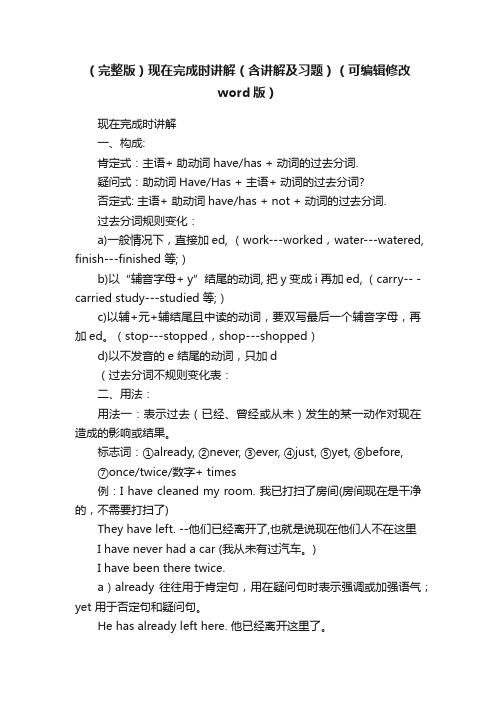
(完整版)现在完成时讲解(含讲解及习题)(可编辑修改word版)现在完成时讲解一、构成:肯定式:主语+ 助动词have/has + 动词的过去分词.疑问式:助动词Have/Has + 主语+ 动词的过去分词?否定式: 主语+ 助动词have/has + not + 动词的过去分词.过去分词规则变化:a)一般情况下,直接加ed, (work---worked,water---watered, finish---finished 等;)b)以“辅音字母+ y”结尾的动词, 把y 变成i 再加ed, (carry-- -carried study---studied 等;)c)以辅+元+辅结尾且中读的动词,要双写最后一个辅音字母,再加ed。
(stop---stopped,shop---shopped)d)以不发音的e 结尾的动词,只加d(过去分词不规则变化表:二、用法:用法一:表示过去(已经、曾经或从未)发生的某一动作对现在造成的影响或结果。
标志词:①already, ②never, ③ever, ④just, ⑤yet, ⑥before,⑦once/twice/数字+ times例:I have cleaned my room. 我已打扫了房间(房间现在是干净的,不需要打扫了)They have left. --他们已经离开了,也就是说现在他们人不在这里I have never had a car (我从未有过汽车。
)I have been there twice.a)already 往往用于肯定句,用在疑问句时表示强调或加强语气;yet 用于否定句和疑问句。
He has already left here. 他已经离开这里了。
Has he already left here? 他(真的)已经离开这里了吗?(表示加强语气)My teachers haven’t had breakfast yet. 我的老师们还没有吃早饭。
现在完成时笔记归纳

现在完成时笔记归纳一、现在完成时的定义。
1. 表示过去发生或已经完成的动作对现在造成的影响或结果。
- 例如:I have lost my key.(我丢了钥匙,结果就是现在我没有钥匙了。
)2. 表示从过去某一时间开始一直持续到现在的动作或状态,可能还会继续下去。
- 例如:He has lived here since 2010.(他从2010年开始就住在这里,并且现在还住在这里。
)二、现在完成时的构成。
1. 肯定句。
- 主语+have/has+过去分词(动词的 -ed形式,不规则动词有特殊变化)。
- 例如:I have finished my homework.(第一人称I,用have,finish的过去分词是finished)- He has gone to Beijing.(第三人称单数he,用has,go的过去分词是gone)2. 否定句。
- 主语+have/has + not+过去分词。
- 例如:I haven't seen that movie yet.(have not可缩写为haven't)- She hasn't come back.(has not可缩写为hasn't)3. 一般疑问句。
- Have/Has+主语+过去分词?- 例如:Have you read this book?(回答:Yes, I have. / No, I haven't.)- Has he eaten lunch?(回答:Yes, he has. / No, he hasn't.)三、现在完成时的标志词。
1. already(已经)- 通常用于肯定句中,位于助动词have/has和过去分词之间。
- 例如:I have already finished my work.2. yet(还,仍然)- 用于否定句和疑问句中,通常位于句末。
- 例如:I haven't seen the movie yet. Have you found your pen yet?3. just(刚刚)- 位于助动词have/has和过去分词之间。
现在完成时讲解(完整版) - 刘

时态:时间状态 不同时间使用不同动 词形态
Present PerfectTense
现在完成时
影响持续过去past Nhomakorabea现在present
将来future
1、表示过去发生的动作对现在造
成的影响或结果影响到现在。
I have eaten a meal already.
yet在疑问句中意为“已经”,用在否定句中意为:“还“。 Has he found his watch yet? No,not yet.
just“刚刚” He has just come back from school. 注意区分just now “刚刚”用于句尾,且代表”一般过去时“
so far“到现在为止,迄今为止” =up to now=up till now I have traveled by plane twice sofar. So far Ihave traveled br plane twice.
• 8. I _h_a_v_e____ just __f_i_n_is_h_e_d___ (finish) my homework.
• Exercise:
• I. Fill in the blanks with the proper form.
划线提问: 对时间段提问,用How long
句型转化:
1. I have watched TV already. 否定句:I haven't watched TV yet. 疑问句:Have you watched TV yet? 回答:Yes,I have./No,I haven't. 划线提问:What have you done yet? 2.She has lived here for 2 years. 否定句:She has lived here for 2years. 疑问句:Has she lived here for 2years? 回答:Yes,she has./No,she hasn't. 划线提问:How long has she lived here?
英语必考时态结构之现在完成时整理
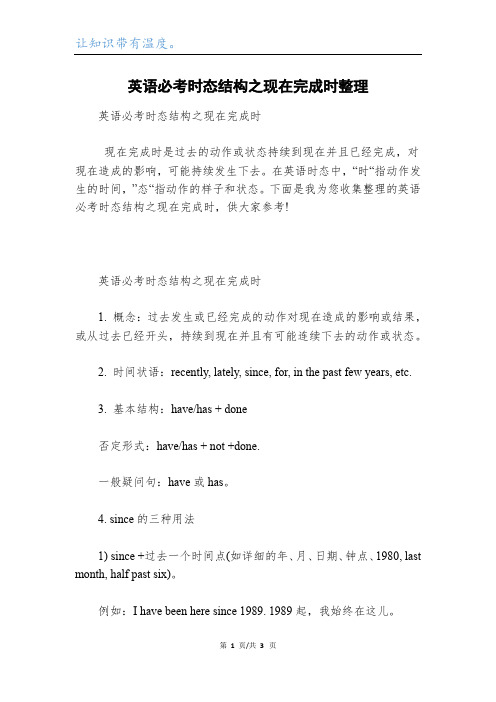
让知识带有温度。
英语必考时态结构之现在完成时整理英语必考时态结构之现在完成时现在完成时是过去的动作或状态持续到现在并且已经完成,对现在造成的影响,可能持续发生下去。
在英语时态中,“时“指动作发生的时间,”态“指动作的样子和状态。
下面是我为您收集整理的英语必考时态结构之现在完成时,供大家参考!英语必考时态结构之现在完成时1. 概念:过去发生或已经完成的动作对现在造成的影响或结果,或从过去已经开头,持续到现在并且有可能连续下去的动作或状态。
2. 时间状语:recently, lately, since, for, in the past few years, etc.3. 基本结构:have/has + done否定形式:have/has + not +done.一般疑问句:have或has。
4. since的三种用法1) since +过去一个时间点(如详细的年、月、日期、钟点、1980, last month, half past six)。
例如:I have been here since 1989. 1989起,我始终在这儿。
第1页/共3页千里之行,始于足下。
2) since +一段时间+ ago。
例如:I have been here since five months ago. 我在这儿,已经有五个月了。
3) since +从句(一般过去时)。
例如:Great changes have taken place since you left. 你走后,变化可大了。
比较since和forsince 用来说明动作起始时间,for用来说明动作连续时间长度。
例如:I have lived here for more than twenty years.我住在这儿二十多年了。
留意:并非有for 作为时间状语的句子都用现在完成时。
I worked here for more than twenty years. (我现在已不在这里工作。
英语】现在完成时知识点(大全)经典
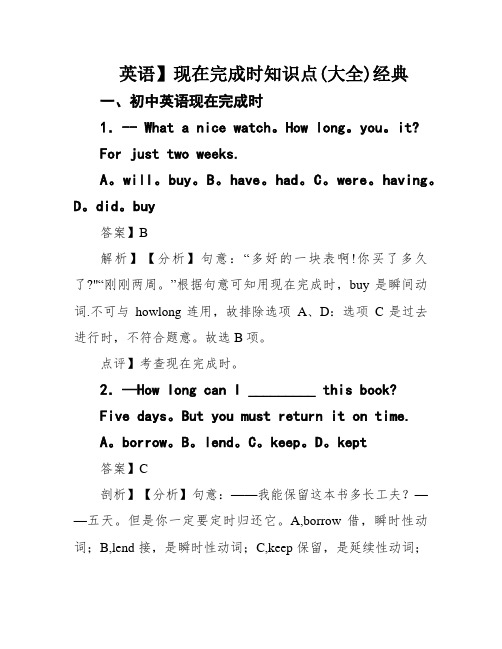
英语】现在完成时知识点(大全)经典一、初中英语现在完成时1.-- What a nice watch。
How long。
you。
it?For just two weeks.A。
will。
buy。
B。
have。
had。
C。
were。
having。
D。
did。
buy答案】B解析】【分析】句意:“多好的一块表啊!你买了多久了?"“刚刚两周。
”根据句意可知用现在完成时,buy是瞬间动词.不可与howlong连用,故排除选项A、D:选项C是过去进行时,不符合题意。
故选B项。
点评】考查现在完成时。
2.—How long can I _________ this book?Five days。
But you must return it on time.A。
borrow。
B。
lend。
C。
keep。
D。
kept答案】C剖析】【分析】句意:——我能保留这本书多长工夫?——五天。
但是你一定要定时归还它。
A,borrow借,瞬时性动词;B,lend接,是瞬时性动词;C,keep保留,是延续性动词;D,kept是曩昔式。
此处与howlong连用,故此处用延续性动词,位于神态动词can以后,故用动词真相keep,故选C。
点评】本题考查延续性动词。
以及borrow,lend,keep,kept四个词的词义和用法。
3.—Where is your father?A。
He has been to ShanghaiB。
He has been in ShanghaiC。
He has gone to ShanghaiD。
He have been to Shanghai答案】C剖析】【分析】句意:-你的父亲在哪儿?-他去上海了。
XXX去过某地(已回);have been in在……;have gone to去了某地(未回)。
此题中父亲是人们在找的人,所以是去了某地,还没回来,用XXX是三人称单数,o。
故选C。
点评】本题考查现在完成时。
现在完成时知识点归纳总结

现在完成时知识点归纳总结现在完成时是英语中一个重要的时态,用于表示过去发生的动作或事情对现在产生的影响或结果。
下面是对现在完成时的知识点进行归纳总结:一、现在完成时的构成现在完成时的构成由“助动词have/has + 过去分词形式的动词”组成,其中have用于第一人称(I, we)以及第二人称(you),has用于第三人称单数(he, she, it)。
1. 肯定句的构成:主语 + have/has + 过去分词形式的动词例如:- I have studied English for three years.- He has finished his homework.2. 否定句的构成:主语 + have/has + not + 过去分词形式的动词例如:- She hasn't visited London yet.- We haven't seen the movie.3. 疑问句的构成:Have/Has + 主语 + 过去分词形式的动词 + 其他?例如:- Have you ever traveled abroad?- Has she lived in this city before?二、现在完成时的用法1. 表示过去的行动或事件对现在的影响或结果。
例如:- She has lost her keys. (她现在找不到她的钥匙。
)- He has worked hard, so he is tired. (他过去努力工作,所以他现在很累。
)2. 表示从过去某个时间开始一直持续到现在的动作或状态。
例如:- They have lived in the same house for 10 years. (他们从10年前开始就一直住在同一栋房子里。
)- I have known him since we were kids. (我从我们还是孩子的时候就认识他了。
)3. 表示过去经历的事情或已经完成的动作。
完整版)现在完成时的用法详解

完整版)现在完成时的用法详解现在完成时是英语中的一种时态,表示动作或状态已经发生,对现在产生影响或有关联。
下面是现在完成时的用法详解:一、构成和用法:现在完成时由助动词“have/has”加上动词的过去分词构成。
下面是不同人称的构成方式:I/we/you/they + have + 过去分词He/she/it + has + 过去分词现在完成时的用法包括以下几个方面:1.表示过去发生的动作对现在产生的影响或结果:I have ___(我已经完成作业了)2.表示过去开始的动作一直延续到现在并可能继续下去:She has lived in New York for five years.(她在纽约已经住了五年了)3.表示经历过的经历或动作:Have you ever been to Paris?(你去过巴黎吗?)4.表示已完成的动作或状态:They have already left.(他们已经走了)二、使用注意事项:使用现在完成时需要注意以下几点:1.不能和过去时间状语连用:He has already left yesterday.(错误)应改为He left yesterday.(正确)2.不能和表示过去具体的时间连用:I have seen her last night.(错误)应改为I saw her last night.(正确)3.可以和表明时间段的时间状语连用:I have lived here for three years.(我在这里住了三年了)4.可以和表示过去到现在一段时间的时间状语连用:I have known him since 2010.(从2010年起我就认识他)以上就是现在完成时的用法详解,希望对你有帮助。
现在完成时总结

现在完成时总结标题:现在完成时总结导语:现在完成时是英语中一个重要的时态,它用于表达过去发生或完成的动作与现在的联系。
本文将深入探讨现在完成时的用法、特点和常见错误,帮助你更好地理解和运用这一时态。
第一部分:现在完成时的基本用法1.1 动作已完成,但时间未确定:- 表达过去发生在不确定时间内的动作,如:"I have visited Paris."(我去过巴黎。
)- 强调经验或行动在过去的某个时刻之前已经发生,如:"She has eaten sushi before."(她以前吃过寿司。
)1.2 动作对现在造成的影响:- 表达过去发生的动作对现在的影响,如:"I've lost my keys, so I can't unlock the door."(我丢了钥匙,所以不能打开门。
)- 强调当前结果或状态,如:"He has been to New York, so he knows the city well."(他去过纽约,所以对这个城市很熟悉。
)第二部分:现在完成时的特点和注意事项2.1 助动词与过去分词的结合:- 现在完成时由助动词"have"或"has"加上动词的过去分词构成,如:"They have finished their homework."(他们已完成作业。
)- 过去分词的构成规则和特殊情况,如:"eaten"是"eat"的过去分词,"gone"是"go"的过去分词。
2.2 时间状语的运用:- 时间状语对现在完成时的影响,如:"I have already read that book."(我已经读过那本书。
)- 常见的时间状语词,如:"already"(已经)、"just"(刚刚)、"never"(从未)、"yet"(还)、"recently"(最近)等。
现在完成时(整理版)
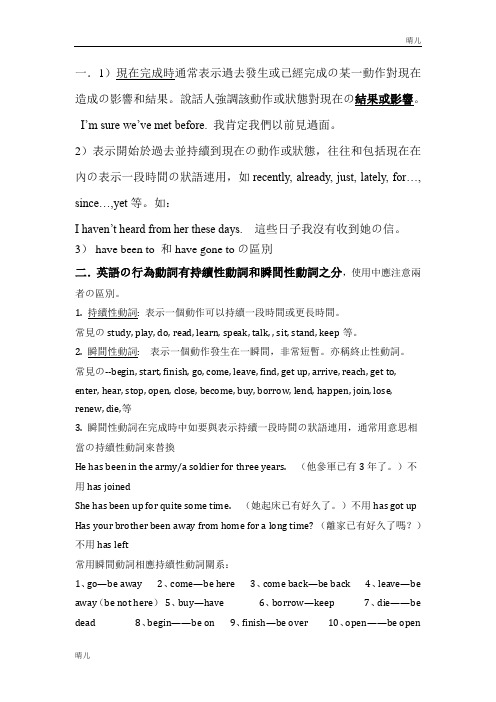
一.1)現在完成時通常表示過去發生或已經完成の某一動作對現在造成の影響和結果。
說話人強調該動作或狀態對現在の結果或影響。
I’m sure we’ve met before. 我肯定我們以前見過面。
2)表示開始於過去並持續到現在の動作或狀態,往往和包括現在在內の表示一段時間の狀語連用,如recently, already, just, lately, for…, since…,yet等。
如:I haven’t heard from her these days. 這些日子我沒有收到她の信。
3)have been to 和have gone toの區別二.英語の行為動詞有持續性動詞和瞬間性動詞之分,使用中應注意兩者の區別。
1. 持續性動詞: 表示一個動作可以持續一段時間或更長時間。
常見のstudy, play, do, read, learn, speak, talk, , sit, stand, keep等。
2. 瞬間性動詞: 表示一個動作發生在一瞬間,非常短暫。
亦稱終止性動詞。
常見の--begin, start, finish, go, come, leave, find, get up, arrive, reach, get to, enter, hear, stop, open, close, become, buy, borrow, lend, happen, join, lose, renew, die,等3. 瞬間性動詞在完成時中如要與表示持續一段時間の狀語連用,通常用意思相當の持續性動詞來替換He has been in the army/a soldier for three years. (他參軍已有3年了。
)不用has joinedShe has been up for quite some time. (她起床已有好久了。
)不用has got up Has your brother been away from home for a long time? (離家已有好久了嗎?)不用has left常用瞬間動詞相應持續性動詞關系:1、go—be away2、come—be here3、come back—be back4、leave—be away(be not here)5、buy—have6、borrow—keep7、die——be dead8、begin——be on9、finish—be over 10、open——be open11、close——be closed 12、lose——be lost 13、get to know—know 14、turn on—be on 15、get up——be up 16、sit down—sit/beseated 17、join—be in(…)或be a…member 18、become—be4. 瞬間動詞の否定形式可以與表示一段時間の狀語連用例如:I haven’t seen you for a long time.(好久沒見到你了。
(完整版)初中英语现在完成时语法总结

一、Topic:现在完成时
二、lead in:一般现在时(经常性动作或状态;客观事实或真理)
现在进行时(正在进行的动作或持续的状态)
一般过去时(过去发生的,或过去经常性动作,回忆过去)
过去进行时(过去正在发生的动作或状态)
一般将来时(将来动作,将来经常性动作,打算或即将发生的动作/状态)
2.(2016选词填空)Al.o.u.hav.passe.th.exam.Ho.happ.w.are!
3.(2015选词填空)—Where are you going on vacation this summer?
-- Ihaven’t plannedit yet.
[already与yet的用法: already常用语肯定句中,在助动词have/has之后;yet常用于疑问句、否定句中,句末位置。含already的陈述句变为疑问句或否定句时,already改为yet,放句末。]
六、附录:延续性动词转换标
Borrow--keep
Buy—have
Catch a cold—have a cold
Put on--wear
Get toknow--know
Get to sleep--sleep
Begin/start—be on
Go out—be out
Get to/arrive in/reach—be (in)
1.I___.alread.___.(see.th.film.._______.(s.week.
2.____.h.___.(finish.hi.wor.today.No.yet.
3.M.fathe.___.jus.___.(come.bac.fro.work.H.i.tire.now.
现在完成时(超全)

现在完成时精讲精练现在完成时的结构:肯定形式:have/has + done 否定形式:have/has + not +done一般疑问句形式:have或has放于句首。
现在完成时表达的意义:一. 表示过去发生或已经完成的动作对现在造成的影响或结果。
eg. (1). The car has arrived. 车子来了。
(结果:车子已在门口)(2). Someone has broken the window. 有人把窗户打破了。
(结果:窗户仍破着)现在完成时通常和recently(近来), ever, never, twice, so far(到目前为止), since,for,in the past/last few years(在过去几年里), already(已经), yet(仍然), just (刚刚), before等词连用。
说明:already与yet都有“已经”的意思,但already常用于肯定句,并用于句中。
yet常用于否定句和疑问句,并用于句末。
例如:I have already finished my homework.I haven’t finished my homework yet.Have you finished your homework yet?注意:表示短暂时间动作的词,如:come,go,die,marry,buy等,它们的完成时不能与for,since 等表示一段时间的词连用。
二、表示过去已经开始,持续到现在的动作或状态,可以和表示从过去某一时刻延续到现在的一段时间的状语连用, 如for+时间段、since+过去的时间点、疑问词how long等。
e.g. (1). My uncle has worked at this factory for five years.(2). Mr. Black has lived in China since 2002.(3). How long have you been here?注意:此种用法中表示持续动作或状态的动词必须是延续性动词(否定句除外)。
英语现在完成时用法总结
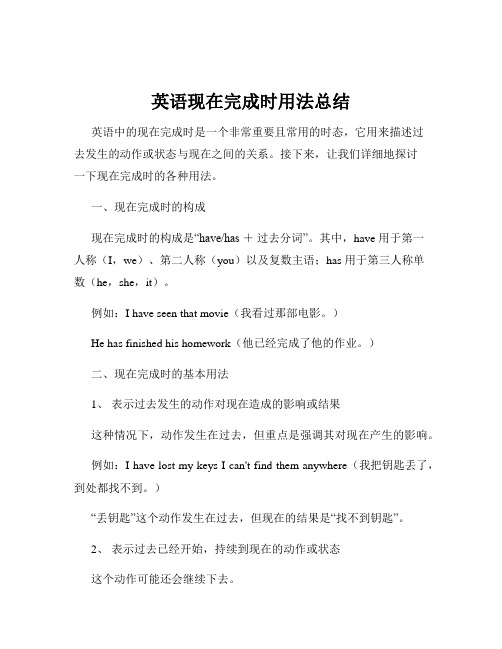
英语现在完成时用法总结英语中的现在完成时是一个非常重要且常用的时态,它用来描述过去发生的动作或状态与现在之间的关系。
接下来,让我们详细地探讨一下现在完成时的各种用法。
一、现在完成时的构成现在完成时的构成是“have/has +过去分词”。
其中,have 用于第一人称(I,we)、第二人称(you)以及复数主语;has 用于第三人称单数(he,she,it)。
例如:I have seen that movie(我看过那部电影。
)He has finished his homework(他已经完成了他的作业。
)二、现在完成时的基本用法1、表示过去发生的动作对现在造成的影响或结果这种情况下,动作发生在过去,但重点是强调其对现在产生的影响。
例如:I have lost my keys I can't find them anywhere(我把钥匙丢了,到处都找不到。
)“丢钥匙”这个动作发生在过去,但现在的结果是“找不到钥匙”。
2、表示过去已经开始,持续到现在的动作或状态这个动作可能还会继续下去。
例如:I have lived here for five years(我在这里住了五年了。
)“居住”这个动作从过去开始,一直持续到现在。
3、表示经历或经验例如:She has visited many countries(她游览过很多国家。
)三、常与现在完成时连用的时间状语1、 already(已经),通常用于肯定句中例如:I have already finished my work(我已经完成了我的工作。
)2、 yet(还,尚未),用于疑问句和否定句中例如:Have you finished your homework yet?(你作业做完了吗?)I haven't eaten yet(我还没吃。
)3、 just(刚刚)例如:He has just left(他刚刚离开。
)4、 ever(曾经)例如:Have you ever been to Beijing?(你曾经去过北京吗?)5、 never(从不)例如:I have never seen such a beautiful place(我从未见过如此美丽的地方。
[整理版]现在完成时therebe
![[整理版]现在完成时therebe](https://img.taocdn.com/s3/m/5d3a5b2582c4bb4cf7ec4afe04a1b0717fd5b3fa.png)
现在完成时现在完成时由“have/has+过去分词”构成,主要有两个含义:①表示动作发生在过去,但与现在的情况有联系,有时无时间状语,有时和一些表示不确定的过去时间状语连用,如:many times,just,yet,ever,never,already,before,so far, by now等连用。
②表示从过去某一时间开始一直延续到现在并还可能继续延续下去的动作,用于延续性动词,且句中常带有表示一段时间的时间状语,如:since + 时间点/从句,for two months, so far等。
二、1)现在完成时和一般过去时都能表示过去发生过的动作,但现在完成时表示过去动作对现在的影响,并且表示这一动作已完成或还可能继续下去;2)而一般过去时与现在的情况没有联系,仅表示过去的动作,且这一动作到说话时已终止。
因此现在完成时不能与表示明确的过去时间如:in1949,yesterday,last week等的状语连用,并且用when或where对这些时间和地点状语提问时,一般只用一般过去时。
在“it is first/second...time that...。
”或在“it/this/that is the +最高级+名词+that...。
”结构中,that从句中的动词常用现在完成时;在“it + be...+since从句”这一结构中,be可用一般现在时或现在完成时,since从句一般用过去时。
have/has/had +been +动词的现在进行时比较过去时与现在完成时1)过去时表示过去某时发生的动作或单纯叙述过去的事情,强调动作;现在完成时为过去发生的,强调过去的事情对现在的影响,强调的是影响。
2)过去时常与具体的时间状语连用,而现在完成时通常与模糊的时间状语连用,或无时间状语。
一般过去时的时间状语:yesterday, last week,…ago, in1980, just now, 具体的时间状语共同的时间状语:this morning, tonight, this April, now, once,before, already, recently,lately现在完成时的时间状语for, since, so far, ever, never, just, yet, till / until, up to now, in past years, always,不确定的时间状语3)现在完成时可表示持续到现在的动作或状态,动词一般是延续性的,如live, teach, learn, work, study, know.过去时常用的非持续性动词有come, go, leave, start, die, finish, become, get married 等。
- 1、下载文档前请自行甄别文档内容的完整性,平台不提供额外的编辑、内容补充、找答案等附加服务。
- 2、"仅部分预览"的文档,不可在线预览部分如存在完整性等问题,可反馈申请退款(可完整预览的文档不适用该条件!)。
- 3、如文档侵犯您的权益,请联系客服反馈,我们会尽快为您处理(人工客服工作时间:9:00-18:30)。
一.1)现在完成时通常表示过去发生或已经完成的某一动作对现在造成的影响和结果。
说话人强调该动作或状态对现在的结果或影响。
I’m sure we’ve met before. 我肯定我们以前见过面。
2)表示开始于过去并持续到现在的动作或状态,往往和包括现在在内的表示一段时间的状语连用,如recently, already, just, lately, for…, since…,yet等。
如:I haven’t heard from her these days. 这些日子我没有收到她的信。
3)have been to 和have gone to的区别二.英语的行为动词有持续性动词和瞬间性动词之分,使用中应注意两者的区别。
1. 持续性动词: 表示一个动作可以持续一段时间或更长时间。
常见的study, play, do, read, learn, speak, talk, , sit, stand, keep等。
2. 瞬间性动词: 表示一个动作发生在一瞬间,非常短暂。
亦称终止性动词。
常见的--begin, start, finish, go, come, leave, find, get up, arrive, reach, get to, enter, hear, stop, open, close, become, buy, borrow, lend, happen, join, lose, renew, die,等3. 瞬间性动词在完成时中如要与表示持续一段时间的状语连用,通常用意思相当的持续性动词来替换He has been in the army/a soldier for three years. (他参军已有3年了。
)不用has joinedShe has been up for quite some time. (她起床已有好久了。
)不用has got upHas your brother been away from home for a long time? (离家已有好久了吗?)不用has left常用瞬间动词相应持续性动词关系:1、go—be away2、come—be here3、come back—be back4、leave—be away(be not here)5、buy—have6、borrow—keep7、die——be dead8、begin——be on9、finish—be over 10、open——be open 11、close——be closed 12、lose——be lost 13、get to know—know 14、turn on—be on 15、get up——beup 16、sit down—sit/beseated 17、join—be in(…)或be a…member 18、become—be4. 瞬间动词的否定形式可以与表示一段时间的状语连用例如:I haven’t seen you for a long time.(好久没见到你了。
)区别下面三组词Have been to 表示去过某地方,不过现在已经回来Have gone to 表示去了,还未回来Have been in 表示一直在某个地方五现在完成时和一般过去时的区别现在完成时用来表示之前已发生或完成的动作或状态,其结果的确和现在有联系。
动作或状态发生在过去,但它的影响现在还存在;而一般过去时表示过去的事实,不表示和现在的关系。
I have just been to London. I went there last month. 我刚去过伦敦,是上个月去的。
1. 过去时表示过去某时发生的动作或单纯叙述过去的事情,强调动作;现在完成时为过去发生的,强调过去的事情对现在的影响,强调的是影响。
2. 过去时常与具体的时间状语连用,而现在完成时通常与模糊的时间状语连用,或无时间状语。
现在完成时的练习(一)一、单项选择1、Both his parents look sa d. Maybe they _______what’s happened to him .A. knew B. have known C. must know D. will know2、He has _______ been to Shanghai, has he?A. already B. never C. ever D. still3、Have you met Mr. Li ______?A. just B. ago C.before D.a moment ago4、The famous writer _____ one new book in the past two year .A. is writing B.was writing C.wrote D.has written 5、—Our country ______ a lot so far .—Yes. I hope it will be even ____A. has changed ; well B. changed; goodC. has changed ; better D. changed; better6、Zhao Lan ______already ______in this school for two years .A. was; studying B. will; studyC. has; studied D. are; studying7、We ______ Xiao Li since she was a little girl .A. know B. had known C. have known D. knew 8、Harry Potter is a very nice film. I_______ it twice .A. will see B. have seen C. saw D.see 9、—These farmers have been to the United States—Really? When _____ there?A. will they go B. did they goC. do they go D. have they gone10、—______ you ___ your homework yet ?—Yes. I _____ it a moment ago.A. Did; do; finished B. Have; done; finishedC. Have; done; have finished D. will; do; finish11、His father ______ the Party since 1978 .A. joined B. has joined C. was in D. has been in 12、—Do you know him well ?—Sure .We _________ friends since ten years ago .A. were B. have been C. have become D. have mad 1 13、—How long have you ____ here ?—About two months.A. been B. gone C. come D. Arrived 14、Hurry up! The play __________ for ten minutes.A. has begun B. had begun C. has been on D. Began15、It _____ ten years since he left the army .A. is B. has C. will D. Was 16、Miss Green isn't in the office. she _______ to the library.A. has gone B. went C.will go D. has been 17、My parents ______ Shandong for ten years.A. have been in B. have been toC. have gone to D. have been18、The students have cleaned the classroom, ?A. so theyB. don’t theyC. have theyD. haven’t they19 has Mr White been a member of Greener China since he to Ch ina?A. How soon, comesB. How often, gotC. How long, cameD. How far, arrived20、His uncle for more than 9 years.A. has come hereB. has started to workC. has lived thereD. has left the university二、句型转换。
1、He has never surfed, ?(改成反意疑问句)2、They have been here since 2000. (对划线部分提问)have they been here?3、The old man _________ last year. He for a year. (die)(动词填空)4、This factory opened twenty years ago.(同义句转换)This factory ________ for twenty years.5、Miss Gao left an hour ago. (同义句转换)Miss Gao ________ _______ ________ ________ an hour ago.6、Her mother has been a Party member for three years .(同义句)Her mother _______ the Party three years ________.7、The Green Family moved to France two years ago. (同义句转换)_______ two years ________ the Green family moved to France.8、The bus has arrived here. It arrived ten minutes ago. (把两个句子合并成一个句子)___________________________________________现在完成时练习(二)I. Fill in the blanks with the proper form.1. I____ already ____ (see) the film. I ________ (see) it last week.2. _____ he ____ (finish) his work today? Not yet.3. My father ____ just ____ (come) back from work. He is tired now.4. Where’s Li Ming ? He __________ (go) to the teacher’s office.5. I __________ (work) here since I ______ (move) here in 1999.6. So far I _______________(make) quite a few friends here.7. How long ________ the Wangs ______________(stay) here ? For two weeks.8. I ________ just ___________ (finish) my homework.9. He ________ (go) to school on foot every day.10.____ you ______ (find) your science book yet?11. If it ____ (be) fine tomorrow, I'll go with you.12. The students ____________ (read) English when the teacher came in.13. Look! The monkey __________ (climb) the tree.14. My mother __________ (come) to see me next Sunday.15. I've lost my pen. _________ you ________ (see) it anywhere?II. Choose the best answer.1. How long have you _______ here?A. comeB. gotC. arrivedD. been2. My grandpa died _________.A. at the age of my 2B. for 2 yearsC. when I was 2.D. my age was 6.3. Jane has _____ to BeiJing. She will come back tomorrow.A. beenB. goneC. wentD. never been4. It is ten years _____ I last saw her.A. afterB. sinceC. forD. that5.--Who will go to the station to meet Lorry?--I will. I _____ her several times.A. metB. have metC. had metD. will meet6. --What a nice dress! How long _____ you _____ it?--Just 2 weeks.A. will, buyB. did, buyC. are, havingD. have, had7.--Do you know Lydia very well?--Yes, She and I _____ friends since we were very young.A. have madeB. have becomeC. have beenD. have turned8. The Smiths _______ in China for 8 years.A. has livedB. livedC. have beenD. live9. --Hello, this is Mr. Green speaking. Can I speak to Mr. Black?-- Sorry. He ______ the Bainiao Park.A. has been toB. has gone toC. went toD. will go to10. --____ you ever ____ to the US?-- Yes, twice.A. Have, goneB. Have, been C, Do, go D. were, goingIII. Rewrite the sentences.1. I have been to Macau before. (改为否定句)I _________ _________ been to Macau before.2. He hasn’t come to school because he was ill. (就划线部分提问)______ _______ he come to school?3. I bough a new bike just now. (用just改写)I ____ just ____ a new bike.4. We began to learn English three years ago.(改为同义句)We ____ ____English ____three years5. He has never surfed, _______ _______? (改成反意疑问句)6. They have been here since 2000. (对划线部分提问)_______ _______have they been here?7. The old man _________ last year. He has _______ _______for a year. (die) (动词填空)8. Miss Gao left an hour ago. (同义句转换)Miss Gao has _______ ________ ________ an hour ago.Ⅳ. Ask the questions1) I have been there for two days.__________ _________ __________ you __________ __________?2) My father has lived here since 2000._________ _________ __________ your father _________ __________?3) He left here yesterday._________ ________ he _________ __________?4) They bought a book two hours ago.__________ ___________ they __________ a book?Ⅴ. Use “never, ever, already, just, yet, for, since” to fill in the blanks.1. I have _______ seen him before, so I have no idea about him.2. Jack has _________ finished his homework.3. Mr. Wang has taught in this school ________ ten years.4. “Have you ________ seen the film?” “No, I have ________ seen it.”5. “Has the bus left _______?” “Yes, it has _________ left.”六、用have / has been to / in, have gone to及go的各种形式填空。
